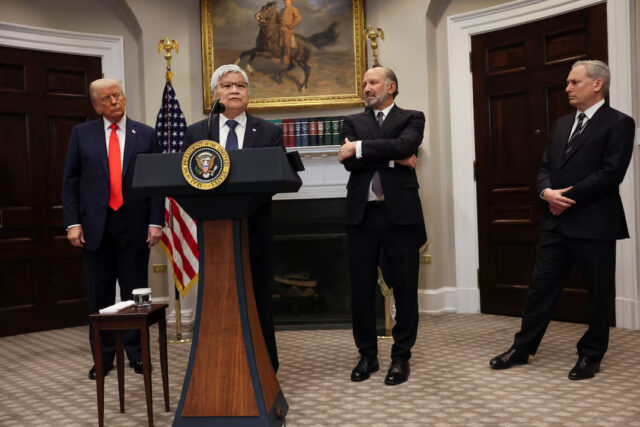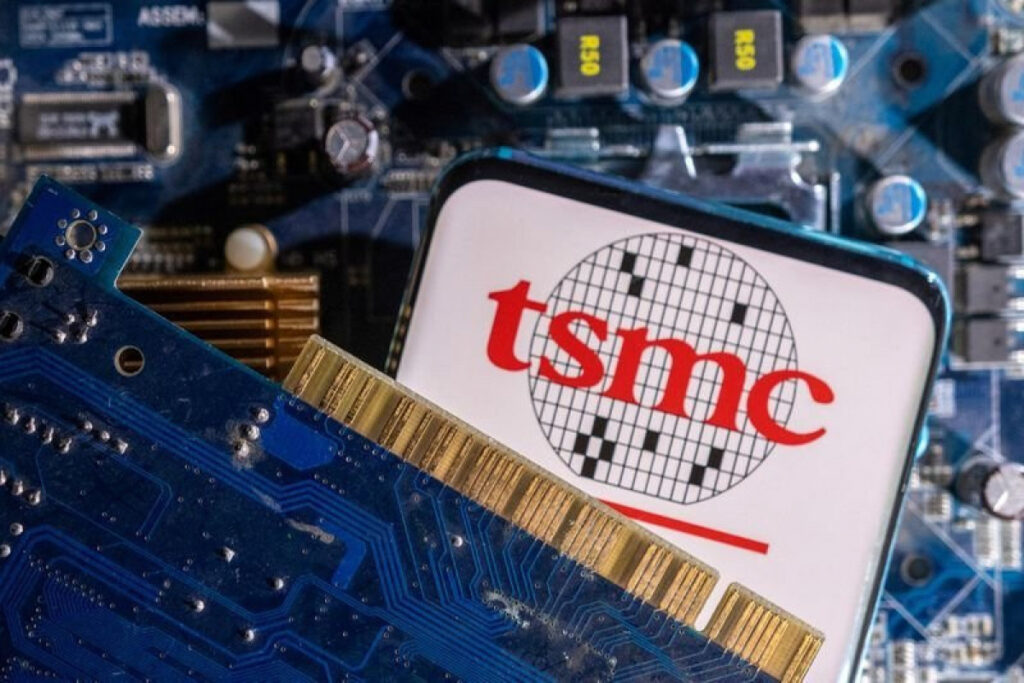
In a landmark move aimed at strengthening America’s semiconductor industry, Taiwan Semiconductor Manufacturing Co. (TSMC) has unveiled plans for a massive $100 billion investment in the United States. The announcement, made jointly by TSMC CEO C.C. Wei and President Donald Trump at the White House, highlights efforts to reduce reliance on foreign chip production and bolster national security.
A Strategic Shift in Semiconductor Manufacturing
TSMC, the world’s largest contract chipmaker, is a crucial supplier to major U.S. tech firms, including Nvidia, Qualcomm, and AMD. The investment will fund the construction of five additional chip fabrication plants across the U.S. These facilities will include three new chip fabrication plants, two advanced packaging centers, and a major research and development hub.

President Trump emphasized the importance of domestic semiconductor production, stating, “We must be able to build the chips and semiconductors that we need right here. It’s a matter of national security for us.” The move aligns with his broader strategy to incentivize American manufacturing and reduce reliance on Taiwan amid increasing geopolitical tensions with China.
Expanding U.S. Semiconductor Capacity
The announcement follows TSMC’s previous commitment to invest $65 billion in U.S. operations, including the construction of a third Arizona factory by 2030. The new investment represents a substantial escalation of those efforts, with construction expected to create 40,000 jobs over the next four years.
While the exact timeline for the new factories remains undisclosed, the initiative underscores a growing shift toward domestic chip production. TSMC’s first Arizona plant, initially plagued by delays and cost overruns, commenced production in 2024. However, higher operational costs in the U.S. remain a concern for the company. “Higher costs are definitely a concern for TSMC,” said Andrew Tsai, chairman of Capital Investment Management Corp.
A Lifeline for Intel and Industry Stability
Beyond securing U.S. supply chains, the investment could have significant implications for the struggling semiconductor giant Intel. Reports suggest that Trump administration officials have engaged in discussions with TSMC about taking a majority stake in a joint venture within Intel’s manufacturing unit. While Intel has yet to comment on these discussions, such a move could signal a potential collaboration between the two industry leaders.
Geopolitical and Economic Ramifications
For Trump, the deal is a major political victory, reinforcing his campaign promise to strengthen American industries and create jobs. The announcement also follows similar commitments from Apple, SoftBank, and Emirati billionaire Hussain Sajwani, who have all pledged multi-billion-dollar investments in the U.S. economy.
Taiwan’s government has responded cautiously to the investment, emphasizing the need for regulatory review. Taiwan’s Presidential Office stated that while the investment aligns with Taiwan’s global competitiveness, it will ensure that the country retains its most advanced semiconductor technology. Spokesperson Karen Kuo noted, “This ensures that while TSMC expands its investment in the U.S., the most advanced processes will remain in Taiwan.”
The Role of the CHIPS Act and U.S. Government Support
TSMC’s expansion in the U.S. is partly driven by the 2022 CHIPS and Science Act, which provides $52.7 billion in subsidies for American semiconductor production. Under this legislation, TSMC has already secured a $6.6 billion government subsidy for its Arizona operations. The new $100 billion investment will also be eligible for a 25% manufacturing investment tax credit.
Trump’s administration was instrumental in bringing TSMC to the U.S. in 2019, setting the stage for the CHIPS Act. The act aims to counter China’s semiconductor dominance and mitigate supply chain vulnerabilities. Commerce Secretary Howard Lutnick stated that companies like TSMC are strategically investing in the U.S. to avoid new tariffs introduced by Trump’s administration.
Looking Ahead: The Future of U.S. Semiconductor Manufacturing
The announcement signals a significant shift in global semiconductor production, with TSMC committing to advanced chip-making technologies in the U.S. The company has agreed to produce 2-nanometer chips in its second Arizona factory by 2028, a major technological leap that could position the U.S. as a key player in the semiconductor industry.
While challenges such as high operational costs and geopolitical considerations remain, the investment marks a crucial step toward securing America’s technological future. As TSMC and the U.S. government continue their partnership, the long-term impact of this initiative on global semiconductor supply chains will be closely watched.
Source: Reuters



